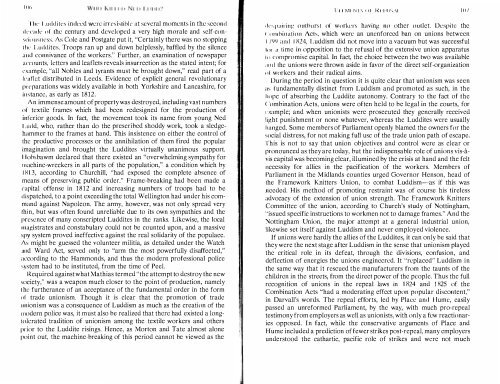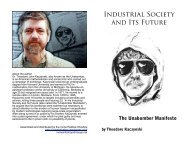CONTENTS - ouroboros ponderosa
CONTENTS - ouroboros ponderosa
CONTENTS - ouroboros ponderosa
You also want an ePaper? Increase the reach of your titles
YUMPU automatically turns print PDFs into web optimized ePapers that Google loves.
11111<br />
I'IIt" I ,uddites indeed WlTC irrcsistihk at scveral moments in the second<br />
,It-cHk 01 the century and developed a very high morale and self-consci,<br />
""ness. J\s Cole and Postgate put it, "Certainly there was no stopping<br />
Ill(" Luddites. Troops ran up and down helplessly, baffled by the silence<br />
alld connivance of the workers." Further, an examination of newspaper<br />
accounts, letters and leat1ets reveals insurrection as the stated intent; for<br />
example, "all Nobles and tyrants must be brought down," read part of a<br />
It-atkt distributed in Leeds. Evidence of explicit general revolutionary<br />
prcrarations was widely available in both Yorkshire and Lancashire, for<br />
instance, as early as 1812.<br />
J\n immense amount of property was destroyed, including vast numbers<br />
01 textile frames which had been redesigned for the production of<br />
inferior goods. In fact, the movement took its name from young Ned<br />
I.udd, who, rather than do the prescribed shoddy work, took a sledgehammer<br />
to the frames at hand. This insistence on either the control of<br />
the productive processes or the annihilation of them fired the popular<br />
imagination and brought the Luddites virtually unanimous support.<br />
Ilohsbawm declared that there existed an "overwhelming sympathy for<br />
Illachine-wreckers in all parts of the population," a condition which by<br />
I X 13, according to Churchill, "had exposed the complete absence of<br />
means of preserving public order." Frame-breaking had been made a<br />
capital offense in 1812 and increasing numbers of troops had to be<br />
dispatched, to a point exceeding the total Wellington had under his command<br />
against Napoleon. The army, however, was not only spread very<br />
Ihin, but was often found unreliable due to its own sympathies and the<br />
presence of many conscripted Luddites in the ranks. Likewise, thc local<br />
magistrates and constabulary could not be counted upon, and a massive<br />
spy system proved ineffective against the real solidarity of the populace.<br />
J\s might be guessed the volunteer militia, as detailed under the Watch<br />
and Ward Act, served only to "arm the most powerfully disaffected,"<br />
according to thc Hammonds, and thus the modern professional police<br />
system had to be instituted, from the time of Peel.<br />
Required against what Mathias termed "the attempt to destroy the new<br />
society," was a weapon much closer to the point of production, namely<br />
t hc furtherance of an acceptance of the fundamental order in the form<br />
"I' trade unionism. Though it is clear that the promotion of trade<br />
unionism was a consequence of Luddism as much as the creation of the<br />
modern police was, it must also be realized that there had existed a longtolerated<br />
tradition of unionism among the textile workers and others<br />
prior to the Luddite risings. Hence, as Morton and Tate almost alone<br />
point out, the machine-breaking of this period cannot be viewed as the<br />
1.llr\'lINl; (l]' 1< 1'1'1 1\;\1 I 1 I 1<br />
d('lp;liril1r, outhurst or wurkL;rs having no other outlet. DL:spik the<br />
('OJlIhination Acts, which were an unenforced ban on unions between<br />
I 1'1'1 and I X24, l.uddism did not move into a vacuum but was successful<br />
10' a time in opposition to the refusal of the extensive union apparatus<br />
I" ('()rnpromisc capital. In fact, the choice between the two was available<br />
.,,,d the unions were thrown aside in favor of the direct self-organization<br />
" I workers and their radical aims.<br />
During the period in question it is quite clcar that unionism was seen<br />
as fundamentally distinct from Luddism and promoted as such, in the<br />
""pc of absorbing the Luddite autonomy. Contrary to the fact of the<br />
( 'ombination Acts, unions were often held to be legal in the courts, for<br />
""ample; and when unionists were prosecuted they generally received<br />
light punishment or none whatever, whereas thc Luddites wcre usually<br />
"anged. Some members of Parliament openly blamed the owners for the<br />
social distress, for not making full usc of the trade union path of escape.<br />
I'his is not to say that union objectives and control wcre as clear or<br />
pronounced as they are today, but the indispensable role of unions vis-avis<br />
capital was becoming clear, illumined by the crisis at hand and the felt<br />
nccessity for allies in the pacification of the workers. Members of<br />
Parliament in the Midlands counties urged Governor Henson, head of<br />
the Framework Knitters Union, to combat Luddism-as if this was<br />
.needed. His method of promoting restraint was of course his tireless<br />
advocacy of the extension of union strength. Thc Framcwork Knitters<br />
Committce of the union, according to Church's study of Nottingham,<br />
"issued specific instructions to workmen not to damage frames." And the<br />
's!ottingham Union, the major attempt at a general industrial union,<br />
likewise set itself against Luddism and never employed violence.<br />
If unions were hardly the allies of the Luddites, it can only be said that<br />
they were the next stage after Luddism in the sense that unionism played<br />
the critical role in its defeat, through thc divisions, confusion, and<br />
deflection of energies the unions enginecred. It "replaced" Luddism in<br />
the same way that it rescued the manufacturers from the taunts of the<br />
children in the streets, from the direct power of the people. Thus thc full<br />
recognition of unions in the repeal laws in 1 R24 and 1 R25 of the<br />
Combination Acts "had a moderating effcct upon popular discontent,"<br />
in Darvall's words. The repeal efforts, led by Place and Hume, easily<br />
passed an unreformed Parliament, by the way, with much pro-repeal<br />
testimony from employers as well as unionists, with only a few reactionaries<br />
opposed. In fact, while the conservative arguments of Place and<br />
Hume included a prediction of fewcr strikes post-repeal, many employers<br />
understood the cathartic, pacific role of strikes and were not much






